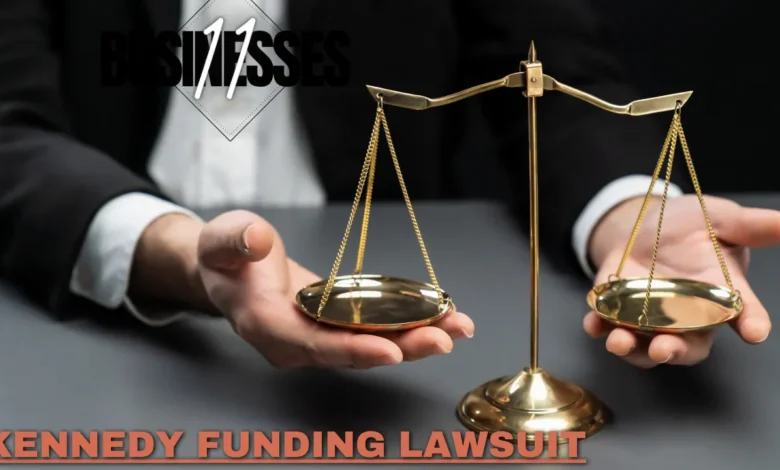Understanding the Kennedy Funding Lawsuit: Key Insights and Implications

The “Kennedy Funding lawsuit” has brought to light significant concerns about the practices of private lenders and the protections available to borrowers.
This legal battle centers on allegations that Kennedy Funding engaged in deceptive lending practices, leading to financial hardships for some clients.
As the case unfolds, it highlights critical issues related to transparency in loan agreements and the responsibilities of lenders.
This article delves into the details of the kennedy funding lawsuit, exploring the main allegations, the responses from Kennedy Funding, and the potential impacts on the lending industry. Whether you’re a borrower seeking to understand your rights or a lender aiming to ensure ethical practices, this comprehensive guide provides essential insights into the ongoing legal dispute.
What Is the Kennedy Funding Lawsuit?
The “Kennedy Funding lawsuit” refers to a legal dispute involving Kennedy Funding, a private lender known for providing loans to businesses and real estate investors.
The kennedy funding lawsuit centers around allegations that Kennedy Funding engaged in unfair lending practices, leading to financial losses for some of its clients.
The plaintiffs in the case argue that the company did not fully disclose the terms and conditions of the loans, resulting in unexpected fees and financial difficulties.
Kennedy Funding, on the other hand, maintains that they followed all legal requirements and that the borrowers were fully informed of the loan terms.
This case has drawn significant attention due to the impact it could have on the lending industry, particularly on private lenders who operate outside traditional banking regulations.
Why Did the Kennedy Funding Lawsuit Begin?
The “Kennedy Funding lawsuit” began when a group of borrowers filed a complaint against the company, claiming that they were misled about the terms of their loans.
According to the plaintiffs, Kennedy Funding promised them favorable loan conditions but failed to deliver on those promises. For example, some borrowers alleged that they were charged higher interest rates and fees than initially agreed upon.
Others claimed that the company’s representatives did not explain the full scope of the loan terms, leading to financial hardships when the loans came due.
These borrowers argued that Kennedy Funding’s practices were deceptive and that they suffered significant financial losses as a result.
The kennedy funding lawsuit aims to hold the company accountable for these alleged wrongdoings and seek compensation for the affected borrowers.
What Are the Main Allegations in the Kennedy Funding Lawsuit?
The main allegations in the “Kennedy Funding lawsuit” revolve around deceptive lending practices.
The plaintiffs accuse Kennedy Funding of failing to disclose critical information about the loans, such as hidden fees, higher-than-expected interest rates, and unfavorable repayment terms. Additionally, the lawsuit alleges that the company used aggressive tactics to push borrowers into accepting loans that were not in their best interest.
Some borrowers claim that they were pressured into signing loan agreements without fully understanding the consequences.
These allegations, if proven true, could indicate that Kennedy Funding violated lending laws designed to protect consumers from unfair practices.
The kennedy funding lawsuit seeks to address these issues by holding the company responsible for any financial harm caused to the borrowers.
How Has Kennedy Funding Responded to the Lawsuit?
Kennedy Funding has denied the allegations made in the “Kennedy Funding lawsuit,” stating that they operated within the bounds of the law.
The company argues that the borrowers were fully aware of the loan terms and that any financial difficulties they experienced were due to their own business decisions, not any wrongdoing on the part of Kennedy Funding.
In their defense, the company has pointed to the loan agreements signed by the plaintiffs, which clearly outline the terms and conditions of the loans.
Kennedy Funding maintains that they provided all necessary information to the borrowers and that any claims of deception are unfounded. The company is vigorously defending itself in court, seeking to dismiss the kennedy funding lawsuit and clear its name.
What Could Be the Impact of the Kennedy Funding Lawsuit?
The “Kennedy Funding lawsuit” could have significant implications for the private lending industry. If the plaintiffs are successful, it could lead to stricter regulations for private lenders, particularly those operating outside the traditional banking system.
The case could set a precedent for how courts view the responsibilities of private lenders in disclosing loan terms and protecting borrowers from unfair practices.
On the other hand, if Kennedy Funding prevails, it could reinforce the notion that borrowers are responsible for understanding the terms of their loans and that private lenders have limited obligations beyond providing the basic terms and conditions.
The outcome of this case could influence future kennedy funding lawsuits involving private lenders and shape the way these companies operate.
What Are the Legal Arguments in the Kennedy Funding Lawsuit?
The legal arguments in the “Kennedy Funding lawsuit” center around the issue of whether the company engaged in deceptive practices or if the borrowers were fully informed of the loan terms.
The plaintiffs argue that Kennedy Funding violated consumer protection laws by failing to disclose important information about the loans.
They claim that the company’s actions were not only unethical but also illegal, and they are seeking compensation for their financial losses. On the other hand, Kennedy Funding’s defense rests on the loan agreements signed by the plaintiffs.
How Are Courts Handling the Kennedy Funding Lawsuit?
The courts handling the “Kennedy Funding lawsuit” are carefully examining the evidence presented by both sides. The case involves complex legal issues, including the interpretation of loan agreements and the application of consumer protection laws.
The court is likely to consider testimony from both the plaintiffs and the defendants, as well as any expert witnesses who can provide insight into the lending industry and the practices in question.
The judge will also review the loan documents and any other evidence that could shed light on whether Kennedy Funding acted improperly.
What Are the Potential Outcomes of the Kennedy Funding Lawsuit?
The potential outcomes of the “Kennedy Funding lawsuit” could vary widely depending on the evidence presented and the court’s interpretation of the law.
If the plaintiffs succeed in proving their case, Kennedy Funding could be ordered to pay significant damages to the affected borrowers.
This could include compensation for financial losses, as well as punitive damages intended to deter similar practices in the future.
The court could also impose restrictions on Kennedy Funding’s operations, requiring the company to change its lending practices to ensure greater transparency.
On the other hand, if Kennedy Funding prevails, the company could avoid any financial penalties and continue its current business practices.
The outcome of this case could also influence other borrowers considering legal action against private lenders, potentially leading to more lawsuits in the future.
How Can Borrowers Protect Themselves From Similar Situations?
To protect themselves from situations like the “Kennedy Funding lawsuit,” borrowers should take several precautions when seeking loans from private lenders. First, it’s important to thoroughly review all loan documents and ensure that they fully understand the terms and conditions. Borrowers should ask questions about any aspects of the loan that are unclear and seek clarification before signing any agreements.
It’s also advisable to consult with a financial advisor or attorney who can provide expert guidance on the loan terms and help identify any potential red flags.
Additionally, borrowers should be cautious of any lender that pressures them to accept a loan quickly or without fully understanding the terms.
By taking these steps, borrowers can reduce the risk of encountering problems similar to those alleged in the Kennedy Funding lawsuit.
Pros and Cons of Private Lending
| Pros | Cons |
| Flexible loan terms | Higher interest rates |
| Faster approval process | Less regulation |
| Access to large sums quickly | Risk of deceptive practices |
| Willingness to finance risky projects | Potential for hidden fees |
| Customizable repayment options | Limited borrower protections |
What Lessons Can Be Learned From the Kennedy Funding Lawsuit?
The “Kennedy Funding lawsuit” offers several important lessons for both borrowers and lenders. For borrowers, the case underscores the importance of fully understanding the terms of any loan before signing an agreement.
It highlights the risks associated with private lending, where less regulation can lead to potential problems. Borrowers should be diligent in reviewing loan documents and seeking expert advice to avoid unexpected issues down the road.
For lenders, the lawsuit serves as a reminder of the importance of transparency and ethical practices.
Companies that fail to fully disclose loan terms or engage in deceptive practices may face legal consequences that can damage their reputation and result in significant financial penalties.
This case is a strong reminder of the need for both parties in a lending agreement to act in good faith and prioritize clear communication.
What Is the Current Status of the Kennedy Funding Lawsuit?
As of now, the “Kennedy Funding lawsuit” is still ongoing, with both sides presenting their arguments in court. The legal process is expected to continue for some time, as the court carefully reviews the evidence and considers the complex legal issues at play.
The outcome of the case remains uncertain, but it is being closely watched by both the lending industry and borrowers who may be affected by the court’s decision.
The final ruling could have far-reaching implications for private lenders and set a precedent for how similar cases are handled in the future. For now, those involved in the case, as well as those in the lending industry, are awaiting the court’s decision with great interest.
FAQs About the Kennedy Funding Lawsuit
What Is the Kennedy Funding Lawsuit About?
The “Kennedy Funding lawsuit” involves allegations that Kennedy Funding, a private lender, engaged in unfair lending practices.
Borrowers claim that they were misled about the terms of their loans, leading to unexpected fees and financial difficulties. The lawsuit seeks to address these claims and hold the company accountable for any financial harm caused.
Who Are the Plaintiffs in the Kennedy Funding Lawsuit?
The plaintiffs in the “Kennedy Funding lawsuit” are borrowers who believe they were misled by the company. These individuals allege that Kennedy Funding did not fully disclose the terms and conditions of their loans, resulting in financial losses. The plaintiffs are seeking compensation for these alleged damages.
How Is Kennedy Funding Responding to the Lawsuit?
Kennedy Funding has denied the allegations in the “Kennedy Funding lawsuit.” The company argues that they operated within the bounds of the law and that the borrowers were fully informed about the loan terms. Kennedy Funding is defending itself in court, aiming to dismiss the lawsuit and clear its name.
What Are the Possible Outcomes of the Kennedy Funding Lawsuit?
The possible outcomes of the “Kennedy Funding lawsuit” include a ruling in favor of the plaintiffs, which could result in significant financial penalties for the company and changes to its lending practices.
Alternatively, if Kennedy Funding prevails, the company may avoid penalties and continue its current operations. The case could also set a precedent for future disputes involving private lenders.
How Can Borrowers Avoid Issues Similar to the Kennedy Funding Lawsuit?
Borrowers can protect themselves by thoroughly reviewing all loan documents and seeking clarification on any unclear terms.
Consulting with a financial advisor or attorney can also help ensure that borrowers fully understand the terms of their loans. Being cautious of any lender that pressures quick decisions can also prevent potential issues.
Conclusion
The “Kennedy Funding lawsuit” highlights important issues in the private lending industry, including the need for transparency and fair practices. The case involves serious allegations of deceptive lending, with borrowers claiming that they were misled about the terms of their loans. Kennedy Funding, in turn, denies these claims and asserts that it acted within legal boundaries.
As the case continues, it remains crucial for all parties involved to stay informed about the legal proceedings and their potential impact.
This kennedy funding lawsuit not only affects those directly involved but also sets a precedent that could influence the broader lending industry.

